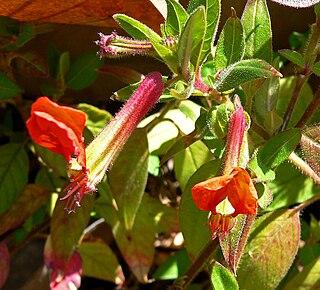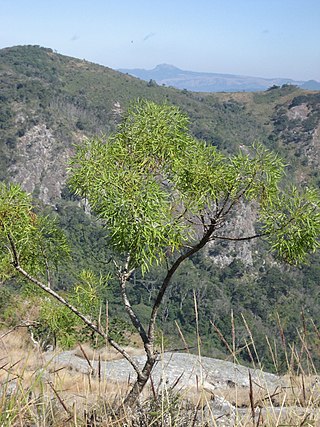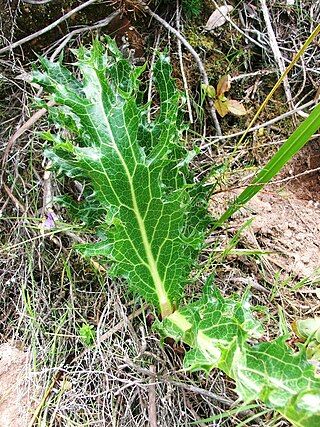
Cuphea is a genus containing about 260 species of annual and perennial flowering plants native to warm temperate to tropical regions of the Americas. The species range from low-growing herbaceous plants to semi-woody shrubs up to 2 m tall. Commonly they are known as cupheas, or, in the case of some species, as cigar plants. The generic name is derived from the Greek word κυφος (kyphos), meaning "bent," "curved," or "humped."

Agathosma is a genus of about 140 species of flowering plants in the family Rutaceae, native to the southern part of Africa. Common names include buchu, boegoe, bucco, bookoo and diosma. Buchu formally denotes two herbal species, prized for their fragrance and medicinal use despite their toxicity. In colloquial use however, the term is applied to a wider set of fragrant shrubs or substitutes.

Ruellia is a genus of flowering plants commonly known as ruellias or wild petunias. They are not closely related to petunias (Petunia) although both genera belong to the same euasterid clade. The genus was named in honor of Jean Ruelle (1474–1537), herbalist and physician to Francis I of France and translator of several works of Dioscorides.

Aeschynomene is a genus of flowering plants in the family Fabaceae, and was recently assigned to the informal monophyletic Dalbergia clade of the Dalbergieae. They are known commonly as jointvetches. They range across tropical and subtropical regions of the Americas, sub-Saharan Africa, south, southeast, and east Asia, and Australia. These legumes are most common in warm regions and many species are aquatic.

Spigelia is a genus of flowering plants in the family Loganiaceae. It contains around 60 species, distributed over the warmer parts of the Americas, from the latitude of Buenos Aires to the Southern United States. It was named after Adriaan van den Spiegel by Carl Linnaeus in his 1753 Species Plantarum; the type species is Spigelia anthelmia. Pinkroot is a common name for plants in this genus.

Scoparia is a genus of mostly tropical plants including Scoparia dulcis known as licorice weed, sweet broom, vassourinha and many other names.

Rubioideae is a subfamily of flowering plants in the family Rubiaceae and contains about 7600 species in 27 tribes.

Spermacoceae is a tribe of flowering plants in the family Rubiaceae and contains about 1346 species in 57 genera. Its representatives are found in the tropics and subtropics.

Heteromorpha is a genus of plants within the family Apiaceae. Its species are native to southern and tropical Africa and the southwestern Arabian Peninsula.
Ctenodon is a genus of flowering plants in the pea family (Fabaceae). It includes 64 species which range from the southern United States through Mexico, Central America, the Caribbean Islands, and northern South America as far as northeastern Argentina.

Galianthe is a genus of flowering plants in the family Rubiaceae. The genus is found from Mexico to tropical America.

Sabulina elegans, the elegant stichwort or Ross' stitchwort, is a species of flowering plant. It is native to Alaska and northwestern Canada.
Zygostigma australe is a species of flowering plant in the family Gentianaceae native to South America. It was originally described as Sabattia australis in 1826 and transferred to the genus Zygostigma, of which it is the only member, in 1908.

Lichtensteinia is a genus of flowering plants belonging to the family Apiaceae. It is also the only genus in the tribe Lichtensteinieae, subfamily Apioideae.











